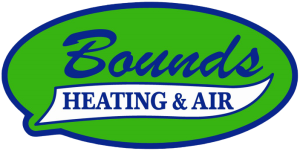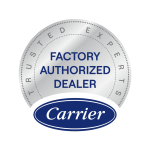Why Ice Forms On Air Conditioners and Why It’s Bad
Below, our Gainesville HVAC pros will explain the most common reasons why air conditioners can “ice up,” and what you can do about it.
1. The system isn’t getting enough airflow.
When everything is working properly, your air conditioner is pulling in the same amount of air that it’s sending out. Warm air from your home blows over the indoor evaporator coil, transferring its heat to the coil and the refrigerant inside it. If something prevents air from entering your AC, the evaporator coil can get so cold that the condensation on it will start to freeze.
So what causes a lack of airflow? Typically, the culprit is a dust-clogged air filter that’s overdue for a replacement. Inadequate airflow can also occur if something is blocking your system’s return vent. If you see ice forming on your AC unit, check these two things first. Then you can defrost your unit by adjusting your thermostat so that only your HVAC system’s fan is running, while neither heating nor cooling.
2. The evaporator coil is too dirty.
As mentioned above, your AC’s evaporator coil contains refrigerant, which allows the coil to get extremely cold. As long as the metal coil is clean, your home’s warm air can easily transfer its heat to the coil and the refrigerant.
However, if the coil becomes coated in dust and grime, the heat transfer process becomes less effective. This can allow the coil to become cold enough for the condensation on it to freeze. If this issue is causing ice to form, it’s best to stop running your air conditioner until a technician can clean the coils (something which is normally done during a preventative maintenance appointment). In the meantime, you can run the fan to defrost your system.
3. The blower fan motor is broken.
Your blower fan is what keeps air moving through your AC system. If there’s a problem with the blower fan motor, the fan won’t function, and your AC can get the airflow issues mentioned above that lead to ice formation. You’ll most likely know that there is a blower fan problem because either you won’t feel any air coming out of your vents, or the fan will only be able to blow at certain speeds.
4. There’s not enough refrigerant in your system.
Yes, this seems counterintuitive. Why would ice form on an AC’s evaporator (indoor) coil when there is a lack of refrigerant?
When your AC has less refrigerant than it should, there’s going to be a lack of pressure in your AC system. This lack of pressure causes the refrigerant to “overcompensate”—instead of absorbing some heat, it removes so much heat at once that the evaporator coil can freeze over. You may even see ice forming outdoors on the refrigerant line leading to your outdoor AC unit..
What To Do If Ice Forms on Your Air Conditioner
Ignoring ice on your air conditioner can lead to major system issues. The ice formation will cause your system to overwork itself to a point where the compressor may be damaged beyond repair. Just how bad of a situation is that? In some cases, the cost to replace a compressor is so high that you may be better off buying a new air conditioner.
Avoid costly repairs by taking the following steps if ice has formed on your air conditioner:
- Turn off the system.
- Make sure nothing is blocking the return vent and that all the other vents are open.
- Put in a fresh, new air filter.
- Turn on your system’s fan to defrost your indoor AC unit. Be sure that only the fan is running and that your HVAC system is not heating or cooling your home’s air.
- If a dirty air filter or a blocked return vent was the problem, you can start to use your air conditioner once the ice has melted.
- If the problem was anything else, while your AC is thawing, contact a licensed HVAC professional for help.
Remember, refrigerant can pose a safety risk and an environmental hazard, so any issues involving refrigerant should only ever be handled by a trained professional.
At Bounds Heating & Air, we offer 24/7 emergency appointments to help return comfort to your Gainesville home! Call us today at (352) 472-2761.






